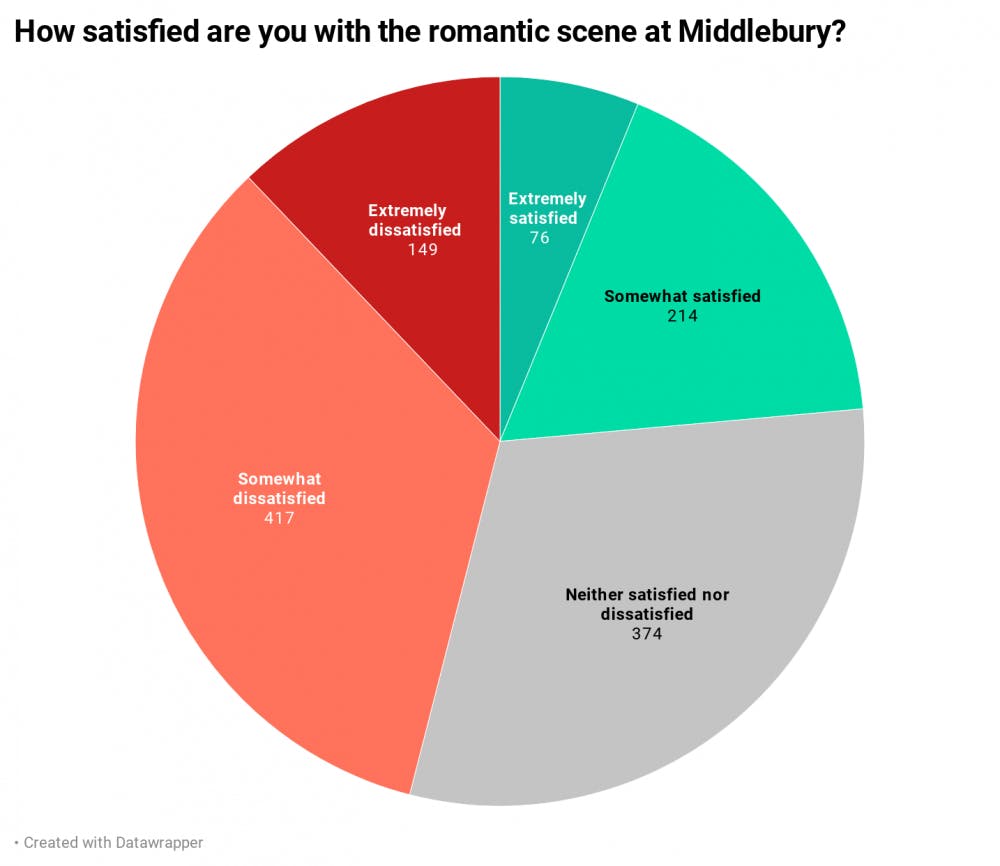The Campus asked Middlebury students to participate in the second annual Zeitgeist survey in November, looking to gain insight into campus culture by asking the questions that are often not discussed. This year’s survey included an exploration of love, relationships and the ever ill-defined “hook-up culture.” A total of 1,245 students responded — nearly 48.25% of the student body.
The vast majority of Middlebury students — 90.82% — prefer a romantic relationship to a hook-up, according to the second annual Zeitgeist survey.
Despite this indicated preference, 50.44% of respondents said that they have had a one-night stand in the past and 43.53% reported having had an, “unspecified, slightly-monogamous ‘thing.’”
About 55.37% of respondents, or 686 students, reported having been in a committed romantic relationship before starting at Middlebury. However, only 39.43% of students, or 491 respondents, reported being in a committed/monogamous relationship at Middlebury.
Athletes are 7.09% more likely to have partaken in a one-night stand and, on average, have a higher number of sexual partners than non-athletes.
Students identifying as part of the LGBTQ+ community are equally as likely to participate in all forms of relationships and sexual activity as non-LGBTQ+ students.
When asked about their satisfaction with the romantic scene at Middlebury, 46.01% of respondents answered that they were somewhat dissatisfied or extremely dissatisfied, 30.41% were neither satisfied nor dissatisfied, 23.58% said that they were somewhat satisfied or extremely satisfied.
The length of relationships for students have varied. 34.90% of respondents said that their longest relationship lasted over a year, while 22.35% have never been in a relationship.
More than one in ten students — 10.17% of respondents — said they have cheated in a romantic relationship.
Respondents were asked how many partners they have engaged in consensual sexual activity within the last 12 months. The most common response was 2-4 partners, with 386 students. 263 students reported they had not engaged in sex within the last year. Respondents who identified as cisgender female were more likely to have not engaged in sex compared to their cisgender male counterparts: 24.25% compared to 16.26%.

Despite the fact that many students have participated in hook-up culture to some degree, it is not clear what this term actually means. Students attempted — and struggled — to define “hook-up” in the survey. 1,130 students heeded the call to demystify the ambiguous (and popular) term.
“Hook-up is a deliberately ambiguous word in English that can connote anything from just making out to full-on sex,” reads one response, adding that “hook-up” is not a term they use when speaking of their own encounters. “I believe that encounters of any sexual nature would constitute a hook-up, but I’d be wary of defining mine as such because of the social implications this term carries.”
Many responses stated that hooking up is the range that begins with making out and ends with sex. Some designated hook-ups as an act that must occur privately, while others included infamous Dance Floor Make Outs (DFMOs) in their definition. Many others explicitly defined hook-ups as, “anything more than kissing”, requiring some sort of sexual encounter.
One respondent wrote that hook-ups are, “Something sexual in nature that can turn into something more, but [that] doesn’t necessarily have too much meaning or … emotion.”
The word “party” appears in responses 40 times. One response says that hook-ups are “having sex with someone after a party and then not getting into a relationship for more than a couple weeks or so afterward.” The words “casual” and “casually” appear 66 times in responses. “Spontaneous” and “spontaneously” appear seven times.
A common theme in the responses is a lack of emotional connection or significance. As one respondent puts it, hook-ups are, “Having a sexual relationship with someone without necessarily the need for an emotional/romantic connection or committment to that person.”
For those involved in the romantic scene at Middlebury, survey respondents were given a range of options to select how they have met romantic partners. The most popular option was through mutual friends, with 527 people, followed by on nights out (495), extracurriculars (275) and through residence halls (225). Respondents also pointed to orientation and on-campus jobs as places they met romantic partners.
The data also shows that Middlebury students tend to download dating apps during their later years at Middlebury. The percentage of students who use dating apps increased as students aged, with only 17.25% of the class of 2023 respondents having used a dating app at the time of the survey compared to 44.19% of the class of 2022, 48.36% of the class of 2021 and 57.32% of the class of 2020.
Editor’s Note: All the results from the second annual Zeitgeist survey will be published on May 7, in the special Zeitgeist issue.
Riley Board, and Caroline Kapp contributed reporting.

Ariadne Will ’22 is a local editor for the Campus.
She has previously served as a staff writer, where she covered topics ranging from Middlebury’s Town Meeting to the College’s dance performances.
Will also works for her hometown newspaper, the Daily Sitka Sentinel, where she covers tourism and the Sitka Planning Commission.
She is studying English and American literature with a minor in gender, sexuality and feminist studies.




